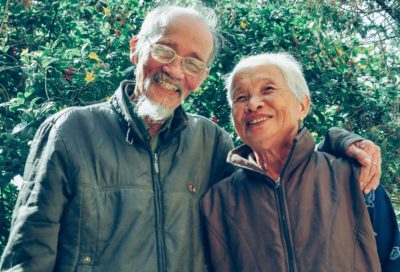
We hear lots about getting older
“Age is just a number” and “You’re only as young as you feel” “Youth is wasted on the young”
“You don‘t stop laughing because you grow old. You grow old because you stop laughing”
These clichés bounce around in our youth culture zeitgeist. As with most homilies there is a grain of truth in their casual wisdom. This is an area that has fascinated me for many years and as I approach my 70th birthday, even more so.
So how is this generation of Boomers doing? Let’s look at happiness of the generation I belong too and affectionately call “Boomer Brats”. Happiness we are told is very important to quality of life and longevity.
Recent research conducted under the umbrella of the British Geriatric Society* looked at the relationship between age, happiness and longevity of 4,478 people. Those who measured as happy on a number of psychological tests lived 19% longer than those who recorded as unhappy.

Another study confirms these findings. An article in Science Daily by Peter Dockrill (August 27th 2018) reported a study of the mental health and happiness measures of 1,546 adults between the ages of 21-100. The study was conducted by the University of California at San Diego. They confirmed the Ageing Paradox. As we get older we have more problems with physical health and deteriorating cognition but we are still happier than other generations.
“In terms of mental health measures – including satisfaction with life, and low levels of perceived stress, anxiety, and depression – the old appeared to win out over the young.
“Their improved sense of psychological well-being was linear and substantial,” said one of the team, geriatric neuropsychiatrist Dilip Jeste. “Participants reported that they felt better about themselves and their lives year upon year, decade after decade.”
In contrast with the older generations, the younger participants in the study showed higher levels of perceived stress, symptoms of depression, and anxiety – with the youngest, those aged in their 20s and 30s, having the roughest time of it.”
So you have to ask – Why do Boomers seem to enjoy their lives more than younger people as this very current research (2018) suggests
- Our goals change from big achievement based goals to enjoying the smaller moments.
My mum used to say- “Ah that was a wonderful cup of tea.”
I’m ecstatic when I’ve weeded the cottage garden and head to the bath with a box of Epsom salts for a good soak
- Goals are more immediate and achievable- we get results quickly and the satisfaction and pleasure that goes with positive goal achievement
- We have time for relationships and enjoy good conversations. Our relationships with our grandkids are often so much easier than the days of being parents ourselves.
- We do things we enjoy that have a positive emotional connection- hobbies, film, the mysterious world of the man cave, sport
- We have a mature emotional intelligence. We’ve learned not to sweat the small stuff. We know how to manage our anger. Older people know what works and what doesn’t in relationships. We have developed a wisdom and insight that makes for a calmer life.
- Life for many older people is simpler. Acquisition of material goods is less attractive. The life style is built and sustaining it becomes the focus.
- We let go of things in the past that hurt us and live for today

Maintaining a sense of well -being and happiness is not always as easy as it sounds. Ageing is not about Pollyanna smiling her way through her older years. When financial trouble, or serious health issues set in, maintaining that happiness can take resilience and courage. But in our active years, we can’t go wrong with making every moment count and seeking out as much happiness as we can create.

